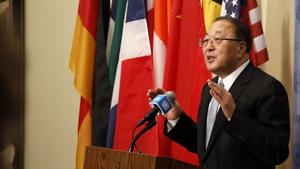 China's permanent representative to the United Nations (UN) Zhang Jun briefs on China's stand on the draft resolution that China and Russia submitted to the UN on the Democratic People's Republic of Korea. At the UN headquarters in New York, on Dec 17, 2019. (LI MUZI / XINHUA)
China's permanent representative to the United Nations (UN) Zhang Jun briefs on China's stand on the draft resolution that China and Russia submitted to the UN on the Democratic People's Republic of Korea. At the UN headquarters in New York, on Dec 17, 2019. (LI MUZI / XINHUA)
UNITED NATIONS – China on Monday joined the global Arms Trade Treaty (ATT) after its envoy to the United Nations (UN) deposited the instrument of accession with UN Secretary-General Antonio Guterres.
Zhang Jun, China's permanent representative to the UN, said the Chinese government "attaches high importance to the problems caused by illicit transfer and abuse of conventional arms”
Zhang Jun, China's permanent representative to the UN, said the Chinese government "attaches high importance to the problems caused by illicit transfer and abuse of conventional arms”. The ATT regulates the international trade in conventional arms.
ALSO READ: China slams US accusations in arms control report as 'absurd'
“China supports the purposes and goals of the treaty and agrees on taking necessary measures to regulate international arms trade and combat illicit arms transfer," Zhang said.
He said China always strictly regulates export of military articles, "with policies and management measures meeting or in some areas even exceeding ATT requirements."
It is worth pointing out that China only allows export to sovereign states, not non-state actors, and this fully demonstrates its high sense of responsibility, Zhang said.
China calls on all parties to strictly regulate the export of military items, disallow their export to non-state actors, and stop interfering in sovereign states' internal affairs through arms export, he added.
ALSO READ: 1st round of US-Russia nuclear arms talks end without results
The envoy noted that accession to the ATT is another important step in China's active participation in global arms trade governance to safeguard international and regional peace and stability.
"It demonstrates China's resolve and sincerity in maintaining international arms control regime, supporting multilateralism, and forging a community with a shared future for mankind. It will further enhance the treaty's universality and contribute to global security governance and international arms control process," Zhang said, adding that the world is facing many challenges, and unilateralism has become the source of trouble.
The ambassador noted that a certain country has quit multilateral arms control agreements and international treaties and organizations in succession, walked away from international commitments, and launched acts of unilateralism and bullying.
READ MORE: Pentagon tests long-banned ballistic missile over Pacific
"This has brought huge uncertainties to the global strategic balance and stability, and seriously undermined the joint efforts of all countries to tackle global challenges. At this critical moment, major powers need to honor commitment, shoulder responsibilities, and set an example by contributing to safeguarding the international order, the rule of law, the role of the UN and multilateralism," Zhang said.
He said that China will continue to "take the side of multilateralism and fairness and justice, abide by the purposes and principles of the UN Charter, uphold international arms control treaties and regimes, and make greater contribution to shaping a well-regulated and sound order for arms trade, maintaining international peace and stability, and promoting common development of the world."
The ATT was adopted by the UN General Assembly on April 2, 2013, and entered into force on Dec. 24, 2014. It now has 107 states parties with China's accession.
READ MORE: Death of INF Treaty raises security risks
At the 74th UN General Assembly held in September 2019, Chinese State Councilor and Foreign Minister Wang Yi announced the start of China's domestic legal procedures for joining the Arms Trade Treaty.
Depositing the instrument of accession marks the conclusion of the domestic legal procedures for China's accession to the treaty. According to a provision of the treaty, the treaty will enter into force for China 90 days after the deposit of the instrument of accession.



